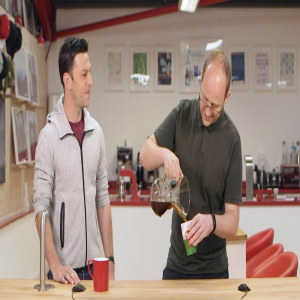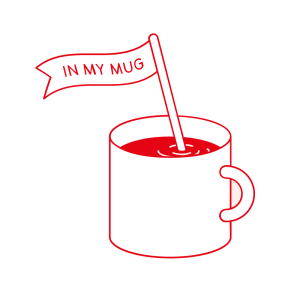
We first came across this coffee all the way back in 2016 after being introduced by the importers that we worked with in Ethiopia at the time. We have been buying from Ana Sora consistently ever since and it's safe to say that this is one of our most popular coffees – when it goes out of season we're flooded with emails asking when it's going to come back... well, happy days are here again! We see a lot of consistency from this coffee and year-on-year it always delivers with those clean blueberry/floral flavours and a little bit of seasonal variation. We always blind cup pre-shipment samples and when we come to this bowl we often say “Ooooh I hope this is the new Ana Sora!” and lo and behold it is, it's a super distinctive coffee. It's our sixth year of roasting this coffee and Ana Sora is now the Ethiopian farm that we buy the most volume from as, for good reason, it's just so popular with everyone!
Ana Sora is a private farm owned by second-generation coffee farmer Israel Degfa. He grew up immersed in various aspects of the coffee industry as his father was a mill manager and his mum sold coffee to commuters in the local bus station. Because he grew up in a coffee producing area, he shows great respect for the farmers, both as business partners and as people. As coffee farms go, Ana Sora is a very new farm: it was only formed in 2013. Coffee trees take an average 2-3 years to produce a crop of cherries that's big enough to sell, so we started buying soon after it first went on the market. It's located at a whopping altitude of between 1,900 and 2,350 metres above sea level. It's a gorgeous but somewhat tiring walk to get there - it's not all just holiday snaps, this coffee buying malarkey!
The estate is located in the Guji Zone in the South of Ethiopia, due East of the town of Yirgacheffe. It’s western neighbour is Uraga and to the East is Adola - both places where Israel owns mills as well. Broadly speaking there are 5 primary coffee producing regions in Ethiopia; Sidamo, Limu, Yirgacheffe (a subsection of Sidamo), Harrar, and Djima – each presenting characteristic flavour profiles. Guji coffees have historically been sold as Sidamo coffees, but today they are thought of as separate and are being more properly marketed as such. The local area is known for coffees with bright acidity and juicy, fruity flavours, often with a tea-like body. It is unusual to find private farms of 250 hectares in Ethiopia (the norm being smallholder gardens of less than 2 hectares each) and even more unusual to find them at such high altitudes. Ethiopian coffee farms are high in general compared to other producing countries (mostly between 1,700 - 2,100 masl) but Ana Sora is on the higher side still, reaching as high as 2,350 masl. The altitude helps with the slower maturation of the coffee cherry, with temperatures averaging between 16-19ºC allowing more time for the plant to develop, which contributes to the super unique cup profile.
Coffee growing is popular locally, and Israel also sources coffee from the surrounding area. Each washing station has around 1000-2000 members, each with one of the small home coffee plots typical of Ethiopia, producing very small quantities. The area is populated by smallholder farmers who speak Oromife and are of Oromo ethnicity. In his role as CEO of producing and exporting company Kerchanshe, Israel believes in helping these farmers through education in husbandry, and also through financial assistance. Their passion for fine coffee is coupled with consistent reinvestment not only in improved infrastructure, technology and processes, but Kerchanshe also invests 10% of its annual profits into social responsibility programs such as building schools and providing clean water to the communities it serves. Israel has already built schools in Adola and Kercha and is currently constructing schools in Gelana Gesha and Kilenso Mokonesa.
The farm used to only produce Naturally processed coffee, however in 2018 the farmers decided to take advantage of the river Turo nearby and built a washing station capable of producing washed coffee using the river as their water source. Since then Ana Sora has produced both Washed and Natural lots and we're super happy to have both for you!
Kicking things off is a floral note, with lemon following hot on its heels. A white sugar sweetness carries through, finishing alongside a clean black tea flavour. The whole thing has a delicate but silky body.
- Country: Ethiopia
- Area: Guji zone
- Nearest town: Yirgacheffe
- Farm: Ana Sora
- Varietal: Indigenous wild varietals
- Processing: Washed
- Owner: Israel Degfa
- Founding year: 2013
- Altitude: 1,900–2,350 m.a.s.l.
- Farm size: 250 hectares, of which 150 hectares are coffee
- Clean cup: (1–8): 7
- Sweetness: (1–8): 6.5
- Acidity: (1–8): 6.5
- Mouthfeel: (1–8): 6.5
- Flavour: (1–8): 6.5
- Aftertaste: (1–8): 6
- Balance: (1–8): 6
- Overall: (1–8): 6.5
- Correction: (+36): +36
- Total: (max. 100): 87.5
Roasting Information
Light to Medium - through first crack, but look to finish the roast as soon as first has ended, just as the smell of those floral aromatics on the roasting beans fades away.
More Episodes
 2021-10-16
2021-10-16
 2021-09-25
2021-09-25
 2021-07-31
2021-07-31
 2021-07-24
2021-07-24
 2021-07-17
2021-07-17
 2021-07-10
2021-07-10
 2021-07-03
2021-07-03
 2021-06-26
2021-06-26
 2021-06-19
2021-06-19
 2021-06-12
2021-06-12
 2021-06-05
2021-06-05
Create your
podcast in
minutes
- Full-featured podcast site
- Unlimited storage and bandwidth
- Comprehensive podcast stats
- Distribute to Apple Podcasts, Spotify, and more
- Make money with your podcast
It is Free
- Privacy Policy
- Cookie Policy
- Terms of Use
- Consent Preferences
- Copyright © 2015-2024 Podbean.com






